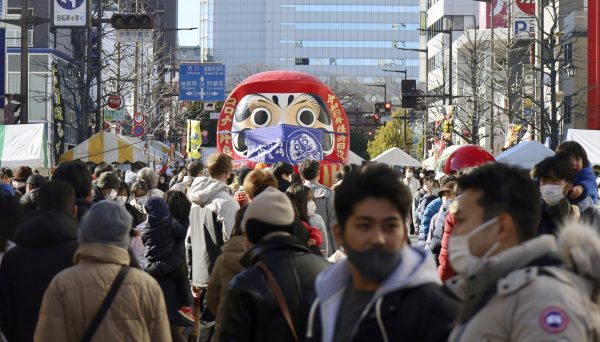When Suga, the continuity candidate, took over from Shinzo Abe in September 2020, he had just one year to prove his credentials before an LDP leadership race and a national election, and the unenviable task of hosting the Olympics during a pandemic. The job was a poisoned chalice.
Despite public opposition, cancelling the Olympics was never an option. Abe had placed outsized importance on the Games as a symbol of Japan’s recovery from 3/11, a vehicle for boosting economic growth and a means to cultivate national pride in the lead up to an elusive referendum on constitutional revision. IOC contracts gave it and not the Japanese government the power to cancel the Games.
As the Delta variant precipitated a spike in COVID-19 infections that coincided with the Olympics, Suga’s approval rating plunged. Almost 60 per cent of respondents in a Kyodo poll cited the Games as a contributing factor worsening Japan’s fifth and biggest wave of COVID 19 infections.
Suga’s poll numbers failed to recover in the lead up to the LDP leadership race in September. After Kishida threw his hat into the ring, LDP factional bosses tapped Suga on the shoulder and convinced him to withdraw.
Kishida’s main rival in the race for the LDP leadership race was Taro Kono. While Kono was the popular choice of the public, his past positions on issues put him at odds with the LDP’s nationalist and conservative factions. An open race saw two female candidates contest the presidency for the first time, the right-wing Sanae Takaichi and the last bastion of LDP liberalness Seiko Noda. While they never really stood a chance, they served to split the vote and send it to a second round where MPs and faction bosses would have greater say diluting the influence of the LDP rank-and-file members who favoured Kono.
The current situation has two implications for Japan going into 2022.
First, Japanese democracy is at its weakest point in the post-war era. The electoral cooperation arrangement between the LDP and Komeito has kept their coalition government in power with ease since 2012.
The opposition parties are fragmented and in disarray. They are unable to inspire Japan’s unaffiliated floating voters, who represent over 40 per cent of the electorate, to turn up and vote in sufficient numbers. The change of leadership in the main opposition Constitutional Democratic Party in November is unlikely to reverse their fortunes unless it can address Japan’s persistently low voter turnout.
Second, the way in which Kishida came to power means he still depends on the conservative nationalist LDP faction bosses. As the first leader of the traditionally liberal Kochikai faction to become prime minister since 1993, there were hopes among Abe critics that Kishida might lead Japan in a new direction. Such hopes are rather faint.
On economic policy, Kishida campaigned on the idea of a new capitalism, increasing redistribution efforts as a means of fuelling growth and addressing the wealth gap which has worsened under the Abenomics economic policy package. He has failed to articulate its substance and is now reliant on the Committee for a New Japanese Capitalism he established to ‘develop a vision for a post-pandemic economy and society’.
On foreign and security policy, Kishida is following the Indo-Pacific vision set out by Abe and Suga. This means prioritising the US alliance and relations with Quad members such as Australia, which he visits this week. Kishida has ostensibly backed constitutional revision in deference to Abe, although he is unlikely to risk serious political capital to deliver it. He has also has championed recognizing missile strikes against enemy bases, even though critics say this would violate the Article 9 peace clause of the constitution.
On China, Kishida walks a tightrope. The government shelved a Diet resolution condemning China’s human rights record while it plans to refrain from sending ‘senior officials’ to the 2022 Beijing Olympics and avoids labelling it a ‘diplomatic boycott’. How Japan and China will mark the 50th anniversary of the normalisation of their post-war relations in September 2022 is yet to be seen. Relations with South Korea, which have been troubled over the wartime ‘comfort women’ and forced labour issues, remain stuck in a rut as Kishida threw the ball back into South Korea’s court in his maiden speech.
The country cries out for a creative policy strategy and constructive Japanese initiatives that find a way to reconcile Japan’s alliance relationship with the United States, its economic partnership with China and the multilateral system on which Japanese and East Asian prosperity has been built.
Unless Kishida can assert his control over the LDP after the July 2022 upper house election and build more than lukewarm public support he will find it difficult to exercise the lever’s of the prime minister’s office to strike a new policy course. When inspiration from his political antecedents like former prime minister Masayoshi Ohira is what’s needed, Kishida is more likely to avoid rocking the boat and to cooperate with the LDP’s conservative nationalist faction bosses.
Ben Ascione is Assistant Professor at the Graduate School of Asia-Pacific Studies, Waseda University.
This article is part of an EAF special feature series on 2021 in review and the year ahead.

